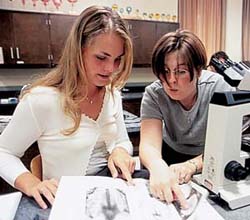

Venture Boldly

Office of Communications
2 East South Street
Galesburg, IL 61401


Meeting the qualifications to get into medical school takes more than a daily dose of academics. Of course, students who are accepted to medical school must have a high level academically (usually at a 3.5 GPA or better) and have done well on the Medical College Admission Test (composite score usually above 30). But, they also must demonstrate a working knowledge of the medical field by taking advantage of volunteer positions, internships, job shadowing opportunities, and showing a commitment to service.
Knox provides a strong pre-medical preparation for students including the strength of the curriculum, internship opportunities, pre-medical honor society, and tutoring. They have the strength of Knox's curriculum, and they take full advantage of the resources available to them, but their success is the result of "their force of will, raw intelligence, hard work and their desire to be in medicine. They are their own candidate," Knox's medical advisor and assistant professor of biology Judy Thorn says.
Qualified Knox College applicants are very successful. While numbers depend on the specific pool of applicants each year, roughly 75-100 percent of the qualified students and alumni who apply are accepted to medical school each year. This year, 100 percent of the graduating seniors who applied to medical school have been accepted, and more than half of them were accepted to medical school as early as the spring of their first year at Knox.
Because of Knox's early identification with Rush Medical College, first-year students, like seniors Jennifer Presley and Nathan Pierce, who meet coursework and academic requirements apply to Rush in the spring of their first year. Keval Patel was accepted at George Washington University at the end of his sophomore year in a similar partnership. The diagnosis is, Knox is attracting more students.
"Our Rush students that complete the program and apply in the spring of their first year have a maturity that med schools expect to see in senior applicants," Professor Thorn says.
"Knox not only tested whether I could handle the academics of medicine, but the individual professors and classes helped me deepen my desire to practice medicine," Jennifer Presley says. Jennifer will be attending Rush Medical College in Chicago in the fall. "Medical schools want well rounded, devoted students, and those are what our pre-med advisor, Judy Thorn, and the whole Knox faculty are so successful in shaping," Jennifer says.
"Being the medical advisor is not about just getting students into medical school. It is to get people where they want to be. Maybe that is medicine or a slue of other things they don't know exists. That is what we do on the Knox campus," Professor Thorn says.
One reason so many pre-med students and science students qualify for Knox's two early medical school programs is the abundance of talented faculty. Professor Thorn does not see herself as the gatekeeper of student accomplishments. "I ride herd on cats," she says. "It is the faculty who trained them and those who teach sciences and did the research. Plus, students themselves, they all did it. These students this year have strong grades, strong scores, are strong essay writers, and have good letters of recommendation."
Besides the one-on-one faculty mentoring and the interaction with other students, Professor Thorn says that a liberal arts education makes the student a better physician. "The majority of time you spend talking to your physician is not discussing organic chemistry, Ph buffers and evolution. That time is spent discussing the human condition. The liberal arts education gives the student the perspective in how people think and makes them a better physician. Science and research give perspective too, but the liberal arts education is important," she says. The most important thing, the most important Knox thing is providing the freedom to flourish. Our 100 percent is not a rare event. It is business as usual."
After a complete examination of her Knox experience, Jennifer says, "I know the high workload at Knox will smooth my transition into medical school and practice. The diversity of the classes and the professors I've encountered at Knox have not just made me a better scientist, but one who better connects with the person behind the illness."
Knox's medical advisor and assistant professor of biology Judy Thorn (right) says the most important thing Knox provides is the freedom to flourish.
Published on June 08, 2007